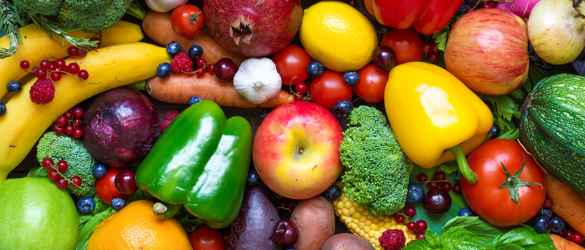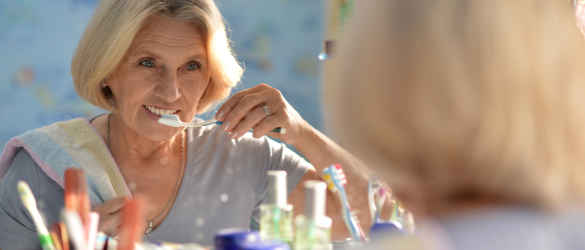
Food and drink
When you have macular disease, preparing and cooking food can seem a little daunting. However, with a few considerations and simple changes you can continue cooking and preparing food.
Preparing food
It does not matter whether you are preparing food or making a cup of tea; using the principle of big, bright and bold will make this easier to do with macular disease. The colour contrast is key as it will make everything stand out more. There are many items that you can buy from the high street to help you continue cooking.
- Use different coloured chopping boards: for example, it can be hard to see a tomato on a red chopping board - using a white chopping board to slice tomatoes makes them easier to see, with the contrast of red on white.
- Sharp knives: try to keep knives sharp as they will cut through food more easily, and are less likely to bounce off a bone or slip and cut you. Use a bigger knife and keep the tip of the knife on the chopping board as this allows more control over the blade.
- Using brightly coloured cooking utensils will help you find them more quickly when you put them down on the worktop. Add brightly coloured tape to utensils you already have to create additional contrast.
- Pots and pans are widely available in bright colours, which can make them stand out on the hob. Try to buy pans with glass lids as this reduces the number of times you need to take the lid off to see if the food is cooking.
- Buy a chip pan, but not for cooking chips - put vegetables in the basket and top up with water. When the vegetables are cooked, you can lift them out all at once.
In the kitchen
There are some other changes you can make to make life easier in the kitchen.
- Increase the lighting in your kitchen. Making it brighter will make everything easier to see. Your local sensory support team will be able to advise you on this.
- Lighting underneath top cupboards will brighten the worktops. When you are preparing food you cast a shadow, and these lights help with this. A task lamp will also help with this.
- Put coloured tape on the inside of your kitchen cupboard doors as this creates colour contrast. This hopefully will make it less likely that you will walk into them.
Kitchen gadgets
Macular disease makes reading kitchen gadgets difficult; there are many different adapted small kitchen gadgets for people with sight loss.
- Kitchen scales are available both as talking scales and in large print.
- Measuring jugs are available in large print.
- Liquid level indicator: this device hangs over the edge of your mug or glass and will beep and vibrate when the liquid touches the sensor.
- Bump-ons: these are small raised dots, which can be placed around the kitchen. They could be used for example to indicate a specific temperature on the oven, or time on your microwave.
- Talking microwaves are very useful if you are unable to see the dials or display on a microwave.
- RNIB Penfriend is a handheld device, which reads out your own audio labels. Stick an audio label onto items such as jars of spices, tins and condiments; you can then record what that item is onto the device. Use the Penfriend to tap the label and it will repeat back to you what that item is.
- Hot water dispenser: the size of a standard kettle which dispenses one mug of boiling water at a time.
Eating and drinking
You have prepared yourself a lovely meal, and now it’s time to sit down and eat. There are a few things you can do to make this easier with macular disease.
- Try to eat somewhere in good light. Good lighting will make the food that you are eating stand out on your plate.
- Create good colour contrast between the table and your crockery. You could use a different coloured tablecloth or place mat.
- Coloured glasses and different coloured coasters can also help create good colour contrast. Locate your glass with your hand near the table; if you misjudge the distance, you are less likely to knock it over.
- It may be necessary on occasion for someone to point out where the food is on your plate; using a clock face to describe where things are can be very helpful.
If you would like any more information, have a look at our Daily living skills page.
Our Nutrition page has information on good foods to eat as part of a balanced diet to help control the progression of your macular disease.
Daily living skills
Advice, hints and tips on managing daily life with macular disease.
Nutrition
Diet is important because certain nutrients protect the body against substances called “oxidants”. Many of the vitamins and minerals found in a healthy diet are called antioxidants.
Around the home
Feel more independent in your home with our practical guides to everyday activities such as preparing meals, personal care, using technology and more.
Support for you
We provide free information and support to those with macular disease, along with their family and friends, to help people keep their independence.
Get the latest news and advice from the Macular Society
To hear about life-changing research, treatments and tips for living with sight loss, subscribe to our monthly enewsletter today. Together we can Beat Macular Disease.
Sign up to our free email newsletter





